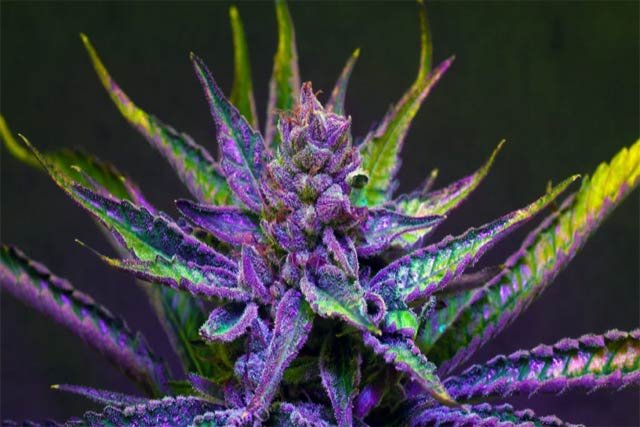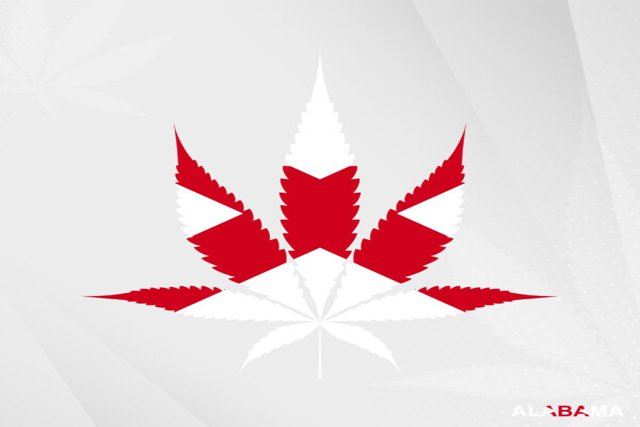If you love marijuana but don’t live in a legal state, you may be interested in Delta-8-THC (delta-8). Thanks to a loophole in the law, delta-8 products will get you high! – are legal across much of the United States. But is delta-8 legal in Alabama?
Delta-8 is legal in Alabama under state and federal law. Alabama does not impose any restrictions on delta-8 and is therefore legal to possess, use, purchase, distribute, and sell. Alabama lawmakers have explored banning delta-8 but have so far been unsuccessful. Since marijuana is illegal in Alabama, legislators could try to ban psychoactive delta-8 products in the future.
Are you wondering why delta-8 is allowed in a state like Alabama? Keep reading to learn more about the legal status of delta-8 in the Yellowhammer State and the prospects of this hot new hemp-based high.
Delta-8 State Law in Alabama
Like most states in the US, delta-8 became legal in Alabama by accident, thanks to the 2018 Agriculture Improvement Act (Farm Bill). The law inadvertently legalized an array of psychoactive cannabinoids, including delta-8, instead of legalizing hemp-based products like non-intoxicating CBD, as intended.
When the Farm Bill passed, Alabama adjusted its hemp laws to align with the federal government. We can see this in Senate Bill 225 (SB 225), signed into law in May 2019.
The bill de-scheduled hemp, which until then was classified as a Schedule 1 substance. But the specific wording of the legislation opened the door for a legal delta-8 market.
SB 225 defines “hemp” as the Cannabis Sativa L. plant and any part of that plant, including all of its compounds. The bill caps delta-9-THC concentration at 0.3% on a dry weight basis but does not limit concentrations of other cannabinoids.
Therefore, while SB 225 ensures that hemp legalization doesn’t legalize classic marijuana through the back door, it opens the door to other tetrahydrocannabinol, such as delta-8 and delta-10.
All of these cannabinoids are very similar, although delta-8 may be slightly less intoxicating. But you can still get high from it; many people in Alabama are!
You may be questioning why both state and federal lawmakers didn’t see the potential for delta-8 and other legal marijuana products when passing the Farm Bill. Essentially, these cannabinoids were known about but mostly viewed as irrelevant.
For starters, delta-8 never looked as if it could be financially viable on its own. Hemp typically contains CBD at concentrations ranging from 20 to 25%, whereas delta-8 occurs in tiny amounts (0.1% or less).
Hence, making delta-8 products would be hundreds of times more expensive than making CBD products. This explains why hemp companies don’t just extract delta-8 from plants and make products in the same way as CBD.
Instead, they harness a process called isomerization, which involves transforming CBD into delta-8. While technically a natural process, this isomerization happens in a laboratory – the ideal laboratory conditions accelerate and maximize the production of delta-8.
With hemp companies now able to create large quantities of delta-8 at will, making products cheaply and selling them at affordable prices is now possible. The workaround has been raising eyebrows in the world of hemp and increasingly among lawmakers, so it shouldn’t surprise you.
Delta-8 and the Federal Law
We’ve covered the details of the Farm Bill in Alabama SB 225. Undoubtedly, the Farm Bill made delta-8 products legal, but recent developments suggest it might not be a closed case.
The Drug Enforcement Administration (DEA) has taken a firm stance against what it describes as “synthetic tetrahydrocannabinol.”
An Interim Final Rule (IFR) published in 2020 declared that these compounds are still Schedule 1 under the Controlled Substances Act. Drugs in this classification include heroin, meth, and psychedelics. They are highly restricted and deemed to have no medical use.
But the problem is that the IFR did not mention delta-8 specifically, and nobody can agree on whether delta-8 is synthetic. Let’s look at the arguments.
Is Delta-8 Synthetic?
As mentioned earlier, isomerization is natural. In the ideal environment, CBD will degrade into delta-8. Of course, setting up the perfect conditions for isomerization in a laboratory differs from natural isomerization.
But both CBD and delta-8 are naturally occurring hemp compounds, and both are legal according to the Farm Bill. So, what’s the problem?
Some argue that this form of isomerization is unnatural and automatically synthetic. For clarity, the process involves refluxing CBD in toluene or another organic solvent. But nothing in the IFR bans this. Sure, it’s sneaky, but it’s not a clear breach of the rules.
Despite the fears, the IFR may not have anything to do with delta-8. When I hear the term “synthetic tetrahydrocannabinol,” I think of spice and other forms of synthetic marijuana.
Spice is synthetic. This super-strength, highly addictive, and even fatal product contains synthetic cannabinoids with no natural origin. Spice is manufactured entirely in the lab.
That sounds much more like what the IFR was targeting than delta-8. But equally, that’s not to say the DEA is okay with a legal delta-8 market and won’t try restricting it in the future.
The delta-8 products on sale right now just don’t fit into a natural or synthetic category. They are a bit of both, albeit much more natural than not. While all the compounds involved in the manufacturing of delta-8 are natural, the industry wouldn’t be possible without human interference.
The History of Delta-8 in Alabama

Delta-8 was first identified in 1941 but wasn’t synthesized until 1965. The federal government kept tight restrictions on marijuana from 1971 onwards with the Controlled Substances Act and has only started relaxing hemp laws over the past few years.
The 2018 Farm Bill set the stage for a legal delta-8 market in Alabama, which became a reality after Governor Kay Ivey passed SB 225 in May 2019.
In 2022, the Alabama Senate Judiciary Committee signaled its intentions to ban delta-8 by adding a controversial amendment to House Bill 2 (HB 2). The bill didn’t involve delta-8 and was meant to ban the drug tianeptine.
The hemp industry successfully argued for the removal of the amendment, citing its potential adverse effects on their industry.
House Representative Alfred Mooney (R-Indian Springs) also tried making delta-8 illegal with an amendment to Alabama’s medical marijuana bill (SB 46). The House Health Committee rejected the amendment, which would have banned all tetrahydrocannabinol.
Buying and Selling Delta-8 in Alabama
You can purchase and sell delta-8 products in Alabama without breaking the law, but you should take some precautions. This is because the hemp industry – and therefore the delta-8 industry – is unregulated.
Without the Food and Drug Administration (FDA) enforcing quality and safety standards, there’s no guarantee of getting a legitimate product. The scammers sadly plague the delta-8 market, so the good guys have to go the extra mile to earn your confidence.
The answer lies in third-party lab tests. Genuine delta-8 brands ask independent laboratories to give them the seal of approval.
Third-party tests examine whether delta-8 products are legal and have less than 0.3% delta-9-THC. They also report cannabinoid concentrations and check that products don’t contain heavy metals, bacteria, or other nasty ingredients.
Don’t purchase products from companies that refuse to provide third-party lab results. Also, avoid those claiming to test products “in-house” – this is likely just a trick to avoid scrutiny.
There are several delta-8 brands out there doing things the right way, so you don’t need to take a chance on products you have limited information about.
Why third-party testing is important
If you doubt whether independent tests are really necessary for the unregulated hemp industry, think back to the vaping crisis of 2019-20. Illegal e-liquids containing dangerous vitamin E acetate led to more than 2,700 hospitalizations and 60 deaths.
Nothing stops brands from cutting corners and using low-cost but potentially unsafe ingredients in unregulated markets. This increases the risk because delta-8 is made via isomerization in a laboratory.
Headshops and gas stations are the worst offenders for stocking fake or low-quality vape juices and delta-8 products, known for certain brick-and-mortar stores.
Third-party approval will put your mind at rest when getting high with delta-8. I recommend buying delta-8 products from a well-known vendor.
Future Outlook for Delta-8 in Alabama

The truth is that nobody knows where the delta-8 market will be in Alabama – or the rest of the US – in the next few months and years. The industry emerged thanks to some legal luck and is certainly thriving, but there’s no doubt many would like to see it ended.
Alabama, which has taken a cautious approach to medical marijuana and firmly opposes recreational pot, appears to be a state that would strongly disapprove of delta-8. Indeed, attempted delta-8 bans through amendments to unrelated bills confirm the hostile stance of some lawmakers.
But even so, the Alabama State Legislature hasn’t banned delta-8, unlike the 18 states across the US that have already done so. That suggests some staying power for the substance and support for the hemp industry in the right places.
Either that or many Alabama lawmakers just haven’t latched onto what delta-8 is. In that case, let’s hope the media focus on delta-8 right now in cannabis circles and beyond doesn’t attract the wrong attention.
Of course, what Alabama thinks about delta-8 might not matter at all if the DEA moves to crush the industry. That remains possible despite the lack of action so far. With several states banning delta-8, the DEA may look closer and decide the federal government needs to get involved.
If the status quo remains, delta-8 will continue to succeed in Alabama, which won’t be legalizing recreational marijuana anytime soon. With the US public becoming increasingly pro-marijuana in recent years, federal legalization is more likely – although not imminent.
The delta-8 industry popped up because of a legal loophole and will perhaps always be on shaky ground. Weed lovers in Alabama should enjoy delta-8 while they can!




